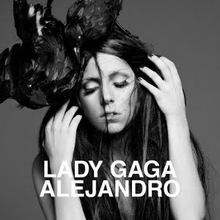| "Alejandro" | ||||
|---|---|---|---|---|
 | ||||
| Single by Lady Gaga | ||||
| from the EP The Fame Monster | ||||
| Language | English | |||
| Released | April 20, 2010 | |||
| Recorded | 2009 | |||
| Studio | FC Walvisch (Amsterdam) | |||
| Genre | Synth-pop | |||
| Length | 4:34 | |||
| Label |
| |||
| Songwriter(s) | ||||
| Producer(s) |
| |||
| Lady Gaga singles chronology | ||||
| ||||
| Music video | ||||
| "Alejandro" on YouTube | ||||
"Alejandro" is a song by American singer Lady Gaga from her third extended play (EP), The Fame Monster (2009)—the reissue of her debut studio album, The Fame (2008). Written and produced by Gaga and RedOne, it was released on April 20, 2010, as the third single from the EP. Interscope Records intended the track "Dance in the Dark" to be the EP's third single after "Alejandro" initially received limited airplay, but Gaga insisted on the latter. A synth-pop track with Europop and Latin pop beats, it opens with a sample from the main melody of Vittorio Monti's "Csárdás". The song was inspired by Gaga's fear of men and is about her bidding farewell to her Latino lovers named Alejandro, Roberto and Fernando.
Some critics praised the track's catchiness and production while others criticized it as unoriginal, mainly due to the influence from the pop acts ABBA and Ace of Base. Retrospective reviewers ranked the song as one of Gaga's best. Following the album's release, the song charted in the UK and Hungary. Upon its release as a single, "Alejandro" topped the Czech, Finnish, Greek, Mexican, Venezuelan, Polish, Russian and Romanian charts, and reached the top five in the US, Australia, Canada and Sweden. In a 2017 journal, which studied structural patterns in melodies of earworm songs, American Psychological Association called "Alejandro" one of the catchiest in the world.
The accompanying music video, directed by fashion photographer Steven Klein, was inspired by Gaga's admiration of her gay friends and gay love. In the video, she dances with male soldiers in a cabaret, interspersed with scenes of near-naked men holding machine guns and Gaga playing a nun who swallows a rosary. Critics complimented the video's idea and dark nature and compared it with the work of 1980s pop artists. The Catholic League criticized Gaga's use of religious symbols in the video. Retrospective commentators analyzed the video's themes, including BDSM, anti-fascism, sexual violence and religion. Gaga performed the song on the ninth season of American Idol and many of her concert tours and residency shows.